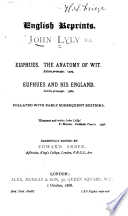“Lette me stande to the maine chance.”
Source: Euphues (Arber [1580]), P. 104. Compare: "The main chance", William Shakespeare, 1 Henry VI, act i, sc. 1.; Samuel Butler, Hudibras, part ii' canto ii.; John Dryden, Persius, satire vi.

Euphues: The Anatomy of Wit , a didactic romance written by John Lyly, was entered in the Stationers' Register 2 December 1578 and published that same year. It was followed by Euphues and his England, registered on 25 July 1579, but not published until Spring of 1580. The name Euphues is derived from Greek meaning "graceful, witty." Lyly adopted the name from Roger Ascham's The Scholemaster, which describes Euphues as a type of student who is "apte by goodnes of witte, and appliable by readines of will, to learning, hauving all other qualities of the mind and partes of the bodie, that must an other day serue learning, not trobled, mangled, and halfed, but sounde, whole, full & hable to do their office" . Lyly's mannered style is characterized by parallel arrangements and periphrases.The style of these novels gave rise to the term euphuism.
“Lette me stande to the maine chance.”
Source: Euphues (Arber [1580]), P. 104. Compare: "The main chance", William Shakespeare, 1 Henry VI, act i, sc. 1.; Samuel Butler, Hudibras, part ii' canto ii.; John Dryden, Persius, satire vi.
“A clere conscience is a sure carde.”
Euphues, p. 207, reported in Bartlett's Familiar Quotations, 10th ed. (1919). Compare: "This is a sure card", Thersytes, circa 1550.
Source: Euphues (Arber [1580]), P. 93. Compare: "Jupiter himself was turned into a satyr, a shepherd, a bull, a swan, a golden shower, and what not for love", Robert Burton, Anatomy of Melancholy, part iii, sec ii, mem. i, subs. 1.
Source: Euphues (Arber [1580]), P. 112.
“I mean not to run with the Hare and holde with the Hounde.”
Source: Euphues (Arber [1580]), P. 107. Compare: "To hold with the hare and run with the hound", John Heywood, Proverbes, Part i, Chap. x.
Source: Euphues (Arber [1580]), P. 86.
“The soft droppes of rain perce the hard marble; many strokes overthrow the tallest oaks.”
Source: Euphues (Arber [1580]), P. 81. Compare: "Water continually dropping will wear hard rocks hollow", Plutarch, Of the Training of Children; "Stillicidi casus lapidem cavat" (translation: "Continual dropping wears away a stone"), Lucretius, i. 314; "Many strokes, though with a little axe,/ Hew down and fell the hardest-timber'd oak", William Shakespeare, 3 Henry VI, act ii, sc. 1.
“It seems to me (said she) that you are in some brown study.”
Source: Euphues (Arber [1580]), P. 80. Compare: "A brown study", Jonathan Swift, Polite Conversation.
“Though the Camomill, the more it is trodden and pressed downe the more it spreadeth.”
Source: Euphues (Arber [1580]), P. 46. Compare: "The camomile, the more it is trodden on the faster it grows", William Shakespeare, 1 Henry IV, act ii, sc. 4.
“For experience teacheth me that straight trees have crooked roots.”
P. 311 http://books.google.com/books?id=3xRbAAAAMAAJ&q="for+experience+teacheth+me+that+straight+trees+have+crooked+roots"&pg=PA311#v=onepage
Euphues and his England
“Be valyaunt, but not too venturous. Let thy attyre bee comely, but not costly.”
Source: Euphues (Arber [1580]), P. 39. Compare: "Costly thy habit as thy purse can buy,/ But not express'd in fancy; rich, not gaudy", William Shakespeare, Hamlet, act i, sc. 3.
“As lyke as one pease is to another.”
Euphues, p. 215, reported in Bartlett's Familiar Quotations, 10th ed. (1919).
“He reckoneth without his Hostesse. Love knoweth no lawes.”
Source: Euphues (Arber [1580]), P. 84. Compare: "Reckeners without their host must recken twice", John Heywood, Proverbes, Part i, Chap. viii.
“Rather fast then surfette, rather starue then striue to exceede.”
Source: Euphues (Arber [1580]), P. 108.
Source: Euphues (Arber [1580]), P. 116. Compare: "'T is a world to see", William Shakespeare, Taming of the Shrew, act ii, sc. 1.
Source: Euphues (Arber [1580]), P. 78. Compare: "Feare may force a man to cast beyond the moone", John Heywood, Proverbes, Part i, Chap. iv.